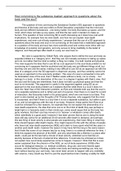SGC
How convincing is the substance dualism approach to questions about the
body and the soul?
The question of how convincing the Substance Dualism (SD) approach to questions
and theories of the body and soul refers to René Descartes’ proposition that the mind and
body are two different substances , one being matter, the body that takes up space, and the
mind, which does not take up any space, and that the two work in tandem to make us
human. This question of how convincing SD is worth discussing as it does have real world
implications, for example how we view death, and how we can explain near-death
experiences, and even out-of-body experiences. I propose that the use of a SD approach to
questions about the body and soul in not convincing on the basis that a materialist approach
to a question of the body and soul has more scientific proof and comes more inline with our
knowledge of evolution and genetics, and only serves to bring credibility to the belief of
religions, and that perhaps after death in a way our soul lives on.
My view is supported by Gilbert Ryle, who argues that to define the soul and body as
separate entities is a ‘category error’, that they are not mutually exclusive to taking up space
and not, but rather that the mind is neither a thing nor matter, it is both mental and physical.
This view supports the idea that to use SD as a an approach to the soul-body problem is not
convincing as it supposes that the soul/mind and the body are not different things at all, but
that they are one and the same, making it very difficult to use SD as an approach as with the
idea of a category error the SD approach is disproven anyway, and thus certainly cannot be
used as an approach to the soul-body problem. This view of a soul is somewhat in line with
he Aristotelian view of the soul, that it ‘Neither exists without a body, nor is a body… but
belongs to a body’, in this description of the soul, to a degree it agrees with Ryle’s view, that
the soul and the body are intertwined, that it does not take up physical space and that the
soul is not immortal. This argument is useful in the argument against using SD as an
approach to the soul-body problem as it explains that the while there is a soul it does not
have the ‘fatal’ flaw of the interaction problem, as Ryle and Aristotle both say that the soul is
not a separate substance and is rather just part of a person, then there is no need for a point
of interaction, like Descartes belief in the pineal gland, which we now know to be false. This
point is also backed up by the thoughts of St Thomas Aquinas, who suggests that the mind
is incorporeal, and that if there is a soul then it is not a separate substance, but rather a part
of us, and is homogenous with the rest of our body. However, these points from Ryle et al
could be criticised for a few reasons, for example they do not explain the phenomena of a
near-death-experience, the idea that once one is on the brink of death they see perhaps a
bright light or a heavenly realm in their minds eye, some would argue that as the body has
gone nowhere, that their soul has moved on to ‘heaven’ or whatever comes after death,
which admittedly is a good point, however it has been proven that as one is dying the brain
does still stay active for an additional 20-40 seconds after death is declared, and perhaps
this last firing of brain activity is what people are experiencing, their brain filling in what they
think should happen after death maybe. One might respond to this with the stories of people
who have had near-death-experiences (NDE) and claim to have spent what felt like years in
another post-death realm, however the reason it may have felt this long is the same reason
that it feels like some of our dreams last for so long, there is no external reference for time, I
think this explains the phenom of the NDE, and why what feels like a lifetime in a place after
death, could just be the last half a minute of brain activity, stretched out to feel like an
eternity because of the lack of external time reference. It could also be criticised as it does
not explain how out-of-body experiences come to happen, however I think that this is even
easier explained than the phenom of the NDE, an out-of-body experience (OOB) often
occurs for biological reasons, i.e. medical conditions, drug use, and even heavily aged
cheese, and the feeling of floating outside ones body and seeing something you may not
have without leaving your own body, has never been proven to happen with any credibility
with science, many would say that it is just the psychoactive brain creating a reality for itself,




